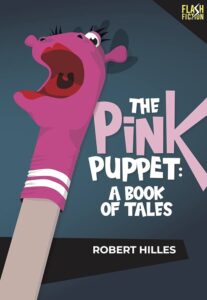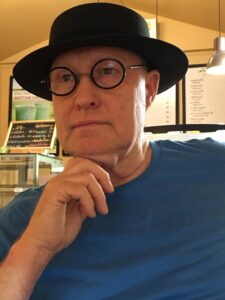A compendium of ‘nudges and little pushes and trims and tucks’
The Pink Puppet: A Book of Tales
by Robert Hilles
Oakville: Mosaic Press, 2023
$24.95 / 9781771616966
Reviewed by Harold Rhenisch
*

This book of micro-fictions is a book of riddles called flash fictions. Their roots are older than literature, almost as old as myths like Rumpelstiltskin, in which an ancient figure will spin straw into gold for you but will make you guess his name.
Myths give us answers about how to live. The questions are always obvious. Riddles, on the other hand, give a question in a way that demands an answer.
“The Dancing Owl” is one of Hilles’ riddles. In it, Liz, we are led to believe, asks Dan to come over (we think), but, no, it’s not like that. Any answer is buried deep, obscured by vibrant but commonplace details rich in character thrown up around it. It’s a showman’s magic.
That’s part of the form, too. Riddles don’t have to have answers (and there are some like that in this book), yet you know there’s an answer in there somewhere. Many times as I read this collection, I flipped back to the beginning of a story to look for the trick of it. It’s like pulling a rabbit from a hat, except the reader gets to do the pulling.
The rabbit here is a pink puppet. I asked Hilles about that puppet. “It’s Buddhist,” he said, then explained the difference between the soul and the body (the puppet) that clothes it.
Many stories unfold within this mythology. The most direct is “Tale of the Mannequin,” which moves between a woman watching a window dresser clothe a mannequin, and then the same woman revisiting the moment later. The situation doesn’t change. Her awareness does. In short fiction, such a reliance on lyric twists of imagery would be a narrative break. In a magic show, it’s the game.
Hilles’ presence in these illusions is played very cool. With a plainsong voice, he tells his stories as if they were real life in a real world, yet he’s not there. Everything is pushed onto characters and situations. What we see instead of the voice of an author is these nudges and little pushes and trims and tucks.
That’s like a puppeteer dressed in black, moving a puppet on stage: both there and not there. Tellingly, when I asked Nanaimo’s Hilles (Don’t Hang Your Soul On That) about his inspirations for this form, he mentioned two thousand years of short fictions, including Aesops’ fables. He stressed that he didn’t want to follow the example of Borges and Kafka. He wasn’t after magic realism.

Given that the book is magic and realism, that’s intriguing. I think he meant he didn’t want a texture that showed him as a character in the pieces. He did say that flash fiction is a genre that allows him to pull back the curtains on tiny moments of life. By careful staging of the scenes, he can present life richly within the boundaries of a moment.
That’s a standard contemporary defence of fictional story-telling. In a succinct portrait of this mythology, he told me that “a hand puppet of a snake is much less scary than an actual snake. So we watch puppet shows partly as way of dealing with our fears because hand puppets especially are less scary than the actual creature.” Well, for some. For others, vice versa.
A story that doesn’t choose between bearable and unbearable is the clever title story. The piece carries elements of the Buddhist riddles called koans and that child of riddling, poetry, to hint at meaning that is not quite graspable because it is what a body knows, not what a mind does.
One word for that, one as old as riddling, is “glimpse.” “I caught a glimpse of a fox,” we might say, meaning we saw the fox in the tale “The Pink Puppet” briefly. It’s a peripheral vision thing, not a direct look, just a flash that catches the eye, gone by the time the mind follows it. We remember it, though. We mind it. We worry it, like a dog with a bone.
Hilles’ riddles are about glimpses such as that.“I would like readers to read each piece in The Pink Puppet,”he told me, “as a morality tale that conveys not a better way to live so much as just forcing the reader to think about themselves and others before moving on.”
They don’t, however, have plots. Instead, they invite readers to contemplate varied characters in varied but similar circumstances.“ The form,” Hilles told me, “requires much discipline or the writer will end up writing a short story or something even longer. It is important to pick the right details and even more important to decide where to start and end the story.” Those are frames. The stories are like miniatures in frames on a parlour wall. You peer forward and go, “Aha,” and smile. Then you look at the next one. Difference is key to the invitation.
Hilles has an abiding interest in late nineteenth-century moral tales, especially Chekhov’s “Fat and Thin,“ an ironic social realistic moment that lives by self-revelation: a sort of tale you might tell at a dinner party. In Hilles’ hands, the tradition expands through Aesop and the Buddhist masters. In other words, this is conservative work. It aims not for revolution but for continuity and insight.
The insight is often spiritual. In “The Blue Bicycle,” for instance, Hilles introduces a woman riding a blue bicycle, then reveals that there is no blue bicycle. Equally direct is the “The Vast White,” a parable about the life of the soul that is also a guide to Hilles’ intent with these tales: “It is not space surrounded by space, or the piercing of light. It is a distance travelled. A place to huddle in, to pause, to calibrate.”
As readers, we do the calibrating. For some, that’s going to be sentimental. For others, it’s going to be a gentle affirmation of openness.
Whichever it is, it’s not exactly the koan, “What is the sound of one hand clapping,” which forces a change in mind. Here, in a watchful linkage of Western and Eastern thought, mind is folded in. The story links enough moments in series that the chain becomes more memorable than its links.
These tales attempt to still such a continually successive present. “The Rusted Chimes,” for instance, honours the realities of aging over the desire to deny them. “The Accident” turns past and present inside out in a moment of crisis. “Washing the Dishes” joins images across the span of a story into a moral that does not need to be present (it isn’t) to be active. At its end, I found myself shaking my head at the absurdity and beauty of randomness, just as the character did. The goal is not understanding. It is of presence.
This presence is not place. The stories have settings, but many are only lightly sketched. At best, in “The Search Light” and “The Rusted Chimes,” environment is a powerful projection of interior states, a kind of Westernized approach to the figure of a Zen poet on a mountaintop between Heaven and Earth. At their slightest, they are completely interchangeable.
Readers interested in the travels of Buddhism in the West may enjoy this book. Readers keen to follow the craft processes of a Governor General’s Award-winning writer may laugh with recognition. Fans of puppetry and contemporary genres that use characters as props in street performance may enjoy the wit of social situations. Readers looking for a sense of place will find only the kind of place known from the British Columbia film industry: recognizable but so universal it could be (and usually is) somewhere else, or nowhere.
Readers keen on plot and conflict, however, or enamoured of the intricate character explorations of Alice Munro or the complex philosophical puzzles of Victoria author John Gould’s flash fiction (such as The End of Me), will find these components presented singly, like lockets.
Readers of that other master of the mysteries of dying within the eternity of the present, Jon Fosse, 2023 Nobel Prize winner, may be frustrated by the book’s polished conclusions, even if they are illusory in the end, subsumed into the mystery of nothingness given real form in every moment.
The Pink Puppet is transfused with a distance that allows images of closeness to be conjured from the page. What it doesn’t do is what Hilles set out to avoid. It doesn’t come together into a vision. These are occasional pieces, very personal, written over years, set down, picked up again, polished, and now presented together. They set Flaubert aside to unite a late Victorian embrace of folk tale, puppetry, detective work and murder ballads with the memory length of small screens.
In that sense, each story is a legal case, slid across a desk, opened, perused, and shut. It’s like reading Netflix.
*

Harold Rhenisch has written some thirty books from the Southern Interior since 1974. He won the George Ryga Prize for The Wolves at Evelyn (Brindle & Glass, 2006), a memoir of German immigrant life from the Similkameen to the Bulkley valleys. His other grasslands books are Tom Thompson’s Shack (New Star, 1999) and Out of the Interior (Ronsdale, 1993). He lived for fifteen years in the South Cariboo and has worked closely with the photographer Chris Harris on Spirit in the Grass (2008), Motherstone (2010), and Cariboo Chilcotin Coast (2016), as well as on The Bowron Lakes (2006), all published by Country Lights; and he writes the blog Okanagan-Okanogan. He is working on Commonage, a history of the Okanagan region, highlighting the American history of Father Charles Pandosy and situating the roots of the Commonage land claim in the North Okanagan in colonial practice in Old Oregon. [Editor’s note: Harold Rhenisch has reviewed books by Sho Yamagushiku, Bradley Peters, Aaron Tucker, Dale Tracy, Dominique Bernier-Cormier, Selina Boan, Joseph Dandurand, Délani Valin, Robert Bringhurst, Rayya Liebich, Sarah de Leeuw, Roger Farr, Stephan Torre, Don Gayton, and Calvin White for BCR. His book Landings (Burton House, 2021) was reviewed by Luanne Armstrong; The Tree Whisperer (Gaspereau, 2021) was reviewed by Adrienne Fitzpatrick.]
*
The British Columbia Review
Interim Editors, 2023-25: Trevor Marc Hughes (non-fiction), Brett Josef Grubisic (fiction)
Publisher: Richard Mackie
Formerly The Ormsby Review, The British Columbia Review is an online book review and journal service for BC writers and readers. The Advisory Board now consists of Jean Barman, Wade Davis, Robin Fisher, Barry Gough, Hugh Johnston, Kathy Mezei, Patricia Roy, Maria Tippett, and Graeme Wynn. Provincial Government Patron (since September 2018): Creative BC. Honorary Patron: Yosef Wosk. Scholarly Patron: SFU Graduate Liberal Studies. The British Columbia Review was founded in 2016 by Richard Mackie and Alan Twigg.
“Only connect.” – E.M. Forster
5 comments on “A compendium of ‘nudges and little pushes and trims and tucks’”
A kamikaze novelist, a type of cultural suicidal
Writes his novel then finds a spot in the wilderness and burns every trace of it
Does Lazarus Longinus ring a bell?
No matter what is written and no matter how or why, Time(illusion) raises its ugly head
How do we deal with Eternity? How? The method we choose becomes the stain in the Akashic Record